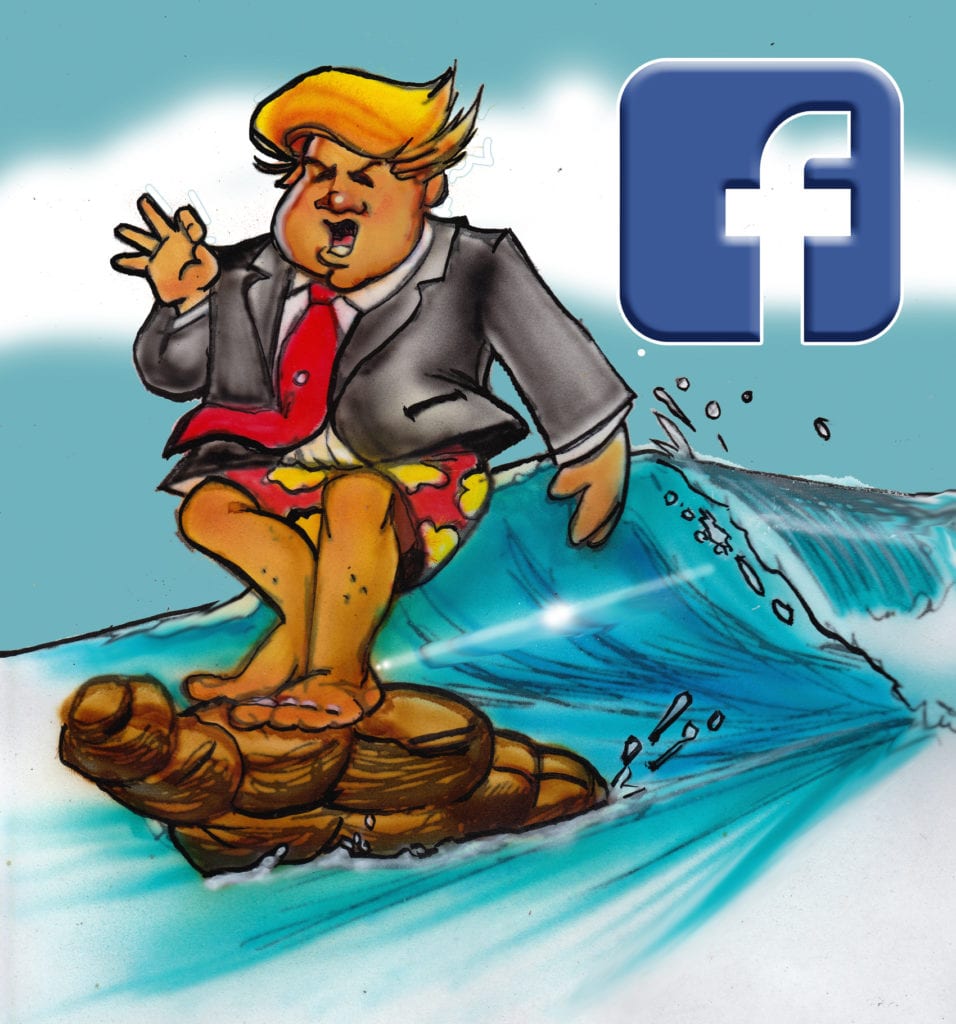Some say the world will end in fire,
Some say in ice.
From what I’ve tasted of desire
I hold with those who favor fire.
But if it had to perish twice,
I think I know enough of hate
To say that for destruction ice
Is also great
And would suffice
– Robert Frost
The Big Picture –
By Glynn Wilson –
WASHINGTON, D.C. — If every system can be viewed as a machine — the world, democracy, the internet — then what happens when all the machines are on fire?
The New York Times editorial opinion section on Sunday uses an adapted piece by Harvard historian Jill Lepore, author of These Truths: A History of the United States, to seemingly make the case that the internet media machine is broken and on fire. The subtle, unstated conclusion: The world can go to hell, but the New York Times will still be here to chronicle its demise.
I don’t know about that. Like any business, it’s just one more mistake and fire away from becoming the “failing New York Times,” as our failing American president in our faltering democracy likes to say.
The overall point is a solid one. Every panacea pledged by every inventor of any new technology inevitably fails to live up to the hype.
For example, an article in Wired magazine that came out in the spring of 2000 announced that the internet had already healed a divided America: “We are, as a nation, better educated, more tolerant, and more connected because of — not in spite of — the convergence of the internet and public life. Partisanship, religion, geography, race, gender, and other traditional political divisions are giving way to a new standard — wiredness — as an organizing principle for political and social attitudes.”
Oops: Too little, too soon.
Of this claim Lepore writes: “Of all the dizzying technological boosterism in American history, from the penny press to the telegraph to the radio, no pronouncement was battier. In the years since, partisan divisions have become fully automated functions, those wires so many fetters.”
Underlying this analysis, however, is a hidden bias favoring the printing press itself. Of course the reason is obvious to me, if no one else.
The web threatens to replace the printing press, and some people will fight to the end to resist that, including New York book publishers and even the New York Times, which probably has a better chance of surviving thanks to the internet than any hope for a future for the printing press. There’s still a lot of stress, anxiety and fear about the web’s economic future, and for good reason.
Everything was going along pretty well for the internet until a few years ago, when an undergraduate Harvard dropout named Mark Zuckerberg created something called thefacebook.com.
Now even a prominent Newhouse publication like The New Yorker is openly wondering: Can Mark Zuckerberg Fix Facebook Before It Breaks Democracy?
Now I’ve got my problems with this article. But if you can get past the lede in, which is written as if going to Zuckerberg’s house for breakfast in Palo Alto, California, was somehow a monumental historic event in and of itself, there are a few useful tidbits. I could do without all the Cambridge Analytica rehash, which I’ve already written about myself more than a year ago.
Yet what becomes clear to me is how Zuckerberg’s Facebook has become THE dominant player on the internet the world over, and there is no going back.
If Facebook were a country, it would have the largest population on earth. More than 2.2 billion people, about a third of humanity, log in at least once a month. That user base has no precedent in the history of American enterprise. Fourteen years after it was founded, in Zuckerberg’s dorm room, Facebook has as many adherents as Christianity.
One might argue with the notion that all people who have at some point gone to the trouble to set up a Facebook account are “adherents” as those who claim fealty to Jesus. Yet there is no doubt that more people depend on Facebook for news, information and entertainment than any newspaper or magazine publisher, any radio station or television network in the history of the world — by far.
I have no doubt that Zuckerberg is a pretty smart guy. His programmed invention took off like nothing we have ever seen before. But according to this profile of him, and others, the only continuing education he seems to be engaged in is reading a few books on human psychology. Really?
I’m wondering other than computer programming and a few undergraduate psychology courses what he knows about other fields in science and the social sciences, say for example sociology, the study of group behavior? Clearly the art and science of figuring out how to sell people things has been perfected to a fault, even by Google, the other tech giant of Silicon Valley. Figuring out individual social networking profiles and web browsing habits has created a way to make billions of dollars in ad revenue that has the traditional media jealous to the core.
What if a programer at the New York Times had created Facebook? Oh, they treated their programmers like simple layout people in the print production room. What a different world we would be living in today if they had been that smart, eh?
Meanwhile, we are looking to this under-educated geek to save us from corrupt politicians and Russian hackers? So far in the attempt at partnerships with real journalists, the Facebook programmers have treated them like, what, naive typists who don’t understand the power of the internet?
Mark Zuckerberg: Preparing for Elections
This is a little like relying on Alabama’s judge Roy Moore for information on the “moral foundation for American law.” As I once told Mr. Moore to his face, his literature review, bibliography and interpretation of the First Amendment are missing quite a few critical links.
Of course he didn’t listen to me either and kept right on running for office, until we beat him back last year.
See all of our original coverage here.
I have my doubts that Facebook can be fixed or replaced by something better. But for now we have no choice but to ride this train until the space train comes along. Maybe Jeff Bezos and/or Elon Musk can find a way to get us all off this planet before it is totally consumed by fire, but I doubt it.
Maybe we can come up with a partial political answer in 2020 — after we dispense with disposing of Donald J. Trump as president after the 2018 elections.
At least there are some pretty smart people thinking about it: Mike Bloomberg Delivers Remarks at the 2018 Global Climate Action Summit.
Let’s see if we can find a way to put out the fires — and make this thing work.















